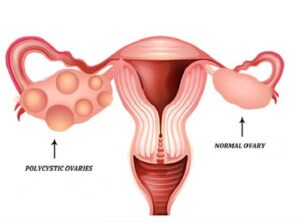PCOD
What is PCOD?
Ayurveda attributes the root cause of PCOD (Polycystic Ovarian Disease) to childhood habits, such as wearing diapers and tight clothing, and adult behaviors, including withholding natural urges like urination. Additionally, consuming incompatible foods and inadequate water intake are identified as contributing factors.
These habits and behaviors obstruct the downward movement of Vata energy, termed Udavarta in Ayurveda. Consequently, these blocks signify imbalances in Kapha energy, further disrupting the hormonal equilibrium. The uterus, recognized as a seat of Vata, is directly impacted by these blocks, influencing the Vata energy within the uterus.
This disruption in Vata energy leads to an elevation in testosterone, the male hormone, triggering the development of male tendencies both internally and externally. In Ayurveda, the fire element (Agni) symbolizes female energy, whereas the water element (Soumya) represents male energy. The ultimate goal is to enhance the fire element in the patient, accomplished by balancing hormones like estrogen.
PCOD
